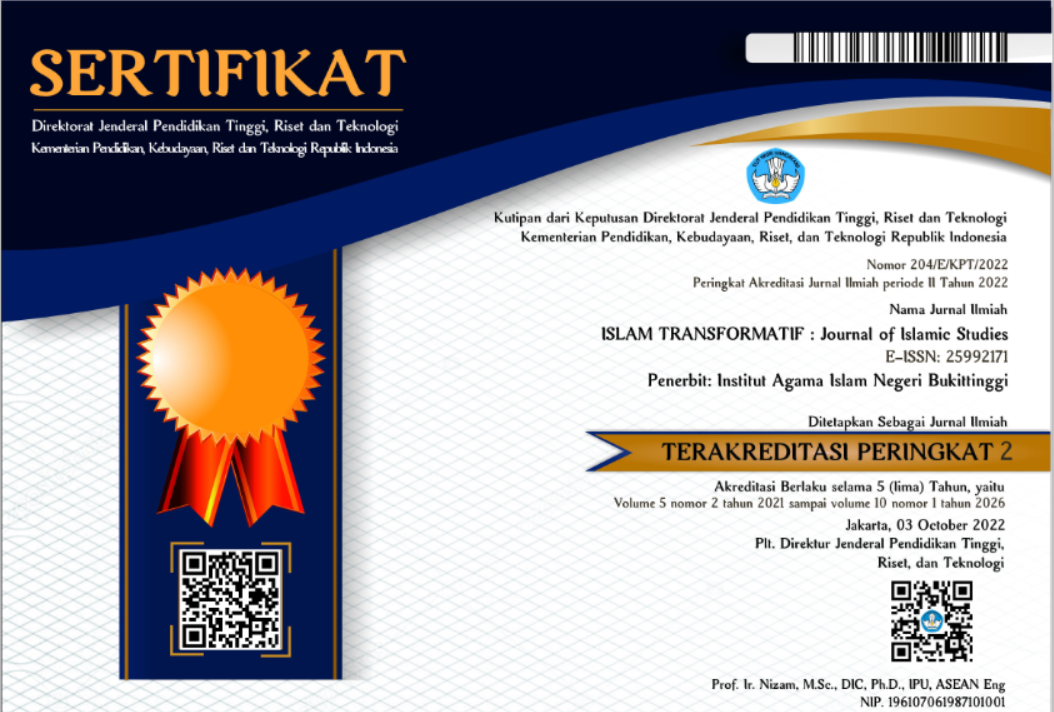Quality of Hadith Shalih in the Book of Sunan Abiy Dâwud Disputed by Nasr al-Dîn al-Albâniy and Shu'aib al-Arnauth
DOI:
https://doi.org/10.30983/it.v5i1.4457Keywords:
Sunan Abiy Dawud, Hadîth Shalih, TakhrijAbstract
This study intends to examine the quality of hadîth shalih in the book Sunan Abiy Dâwud which was disputed by Nâshir al-Dîn al-Albâniy and Syu'aib al-Arnauth, namely by using library research (library research), which is to collect accurate and relevant data. This is then processed with a descriptive qualitative analytical approach through inductive and comparative thinking methods. In addition, it also uses the hadîth research step to determine the quality of hadîth both from the side of the sanad and its eyes. Based on the analysis, it can be concluded that the hadiths termed shahih Abû Dâwud, which are also debated by al-Albaniy and al-Arnauth in assessing their quality, when tested with authentic criteria do not necessarily mean maqbûl or authentic quality. and hasan, but some have the status of dha'if. Thus hadîth shalih can contain two possibilities, namely lil i'tibâr (to be studied) or li al-ihtijâj (used as evidence).
 Penelitian ini bermaksud mengkaji kualitas hadîth shalih dalam kitab Sunan Abiy Dâwud yang diperselisihkan oleh Nâshir al-Dîn al-Albâniy dan Syu’aib al-Arnauth, yaitu dengan menggunakan library research (penelitian kepustakaan) yaitu mengumpulkan data-data yang akurat dan relevan dengan pembahasan ini kemudian diolah dengan metode pendekatan deskriptif analitis kualitatif melalui metode berfikir induktif dan komparatif. Di samping itu penulis juga menggunakan langkah penelitian hadis untuk mengetahui kualitas hadis baik dari sisi sanad maupun matan-nya. Berdasarkan analisa dapat disimpulkan bahwa hadis  yang diistilahkan shâlih Abû Dâwud, yang juga diperdebatkan al-Albâniy dan al-Arnauth dalam menilai kualitasnya, ketika diuji dengan kriteria ke-shahih-an tidak serta merta berarti maqbûl atau berkualitas shahih dan hasan,  akan tetapi ada yang berstatus dha’if. Dengan demikian hadîth shalih dapat mengandung dua kemungkinan yaitu lil i’tibâr  (untuk dikaji) atau  li al-ihtijâj (dijadikan hujjah).
References
al-‘Asqalaniy, Syihab al-Din Abu al-Fadhl Ahmad ibn Ali ibn Hajar. Tahdzib al-Tahdzib. Beirut: Dar Kutub al-‘Ilmiyyah, 1994.
Al-‘Asqalâniy, Syihabuddin Abul Fadhl Ahmad bin Ali bin Muhammad bin Muhammad bin Ali bin Mahmud bin Ahmad bin Hajar. Al-Îshabah fiy Tamyîz al-Shahâbah,. Dâr al-Jail, n.d.
Al-Albâniy, Muhammad Nâshir al-Dîn. Maqâlât Albani. Jakarta: Pustaka Azzam, 2002.
———. Sunan Abiy Dâwud. Riyadh: Maktabah Ma’arif, n.d.
Al-Arnauth, Syu’aib. Sunan Abiy Dâwud. Beirut: Dâr al-Risâlah al-‘Ilmiyyah, 2009.
Al-Azdiy, Abu Dâwud Sulaimân ibn al-‘Asy’as al-Sijistâniy. “Sunan Abiy Dâwud.†In 1, 338. Beirut: Dar ibn Hazm, 1997.
al-Dimasyqiy, Abû al-Fidâ Ismâ’îl ibn ‘Umar ibn Katsîr. Al-Bidâyah wa al-Nihâyah. Beirut: Dâr al-Fikr, 2001.
al-Dzahabiy, Imam Syams al-Dîn Abû ‘Abd Allah Muhammad ibn Ahmad. “Siyar A’lam Al-Nubalâ’.†In 13, 204. Beirut: Mu’assasah al-Risâlah, 1993.
Al-Mizziy, Jamâl al-Dîn Hajjâj Yûsuf. Tahdzib al-Kamâl fi Asmâ’ al-Rijâl. Beirut: Dâr al-Fikr, 1994.
Al-Nûsitâniy, Muhammad Muhammad ibn Muhammad Jamîl. Al-Madkhal ila Sunan Abiy Dâwud. Cairo: Maktab al-Syu’un al-Fanniyah, 2008.
Al-Râziy, Al-Imam al-Hafidz Syaikh al-Islam Abu Muhammad ‘Abd al-Rahmân ibn Abiy Hâtim Muhammad ibn Idris ibn Mundzir al-Tamîmiy al- Hanzhaliy. Al-Jarh wa Ta’dîl. Beirut: Dâr Ihya al-Turâts, 1953.
Aleksmana, Randi. “Studi Tehadap Makna Istilah Sakatu ‘Anhu dalam Risalah Imam Abu Dawud.†Universitas Islam Negeri Sultan Syarif Kasim Riau, 2017.
Amin, Muhammad. “Studi Kitab Hadits Telaah Terhadap Kitab Sunan Abiy Dawud.†Tadbir 1, no.1 (2019).
Azami, Muhammad Mustafa. Studies in Hadits Metodology and Literature. Indianapolis: American Trust Publication, 1997.
Farida, Umma. “Pemaknaan Kriteria Kesahihahan Hadis Muḥammad Nâṣir al-Dîn Al-Albânî dan Implementasinya dalam Penilaian Hadis.†Mutawatir 6, no. 1 (November 7, 2017): 52–84. https://doi.org/10.15642/mutawatir.2016.6.1.52-84.
Hafizzullah, Hafizzullah, and Sefri Auliya. “Kitab ‘Aun Al Ma’bûd ‘Ala Syarh Sunan Abi Daud.†Alfuad: Jurnal Sosial Keagamaan 1, no. 1 (2018). https://doi.org/10.31958/alfuad.v2i1.1208.
Khalifah, Muhammad Rasyâd. Madrasah Al-Hadîts fi Mishr Mundzu Suqûth Baghdad ila Nihâyah Qarni al-‘Asyir al-Hijriy. Cairo: Univ. Al-Azhar, 2010.
Ma’sum, Ma’sum. “Metode Abû Dâwud dalam Menulis Al-Sunan.†Mutawatir 1, no. 2 (September 9, 2015): 180. https://doi.org/10.15642/mutawatir.2011.1.2.180-192
Muhammad ibn Abiy Ya’la, Abû al-Husain. Thabaqat Al-Hanabilah. Beirut: : Dar al-Ma’rifah, n.d.
Muhammad Muhammad, Abu Syuhbah. Fi Rihâb al-Sunnah al-Kutub al-Sihhah al- Sittah. Silsilah al-Buhuts al-Islâmiy, 1995.
Pardosi, Fakhrurrozi. “Studi Kitab Sunan Abi Daud.†Waraqat : Jurnal Ilmu-Ilmu Keislaman 4, no. 1 (2020). https://doi.org/10.51590/waraqat.v4i1.68.
Syarifah, Umaiyatus. “Peran dan Kontribusi Nashiruddin Al-Albani (w. 1998) dalam Perkembangan Ilmu Hadis.†Riwayah 1, no. 1 (2015): 1–18.
Downloads
Published
How to Cite
Issue
Section
Citation Check
License
Authors who publish with this journal agree to the following terms:
- Authors retain copyright and grant the journal right of first publication with the work simultaneously licensed under a Creative Commons Attribution-ShareAlike 4.0 International License that allows others to share the work with an acknowledgment of the work's authorship and initial publication in this journal.
- Authors are able to enter into separate, additional contractual arrangements for the non-exclusive distribution of the journal's published version of the work (e.g., post it to an institutional repository or publish it in a book), with an acknowledgment of its initial publication in this journal.
- Authors are permitted and encouraged to post their work online (e.g., in institutional repositories or on their website) prior to and during the submission process, as it can lead to productive exchanges, as well as earlier and greater citation of published work (See The Effect of Open Access).




